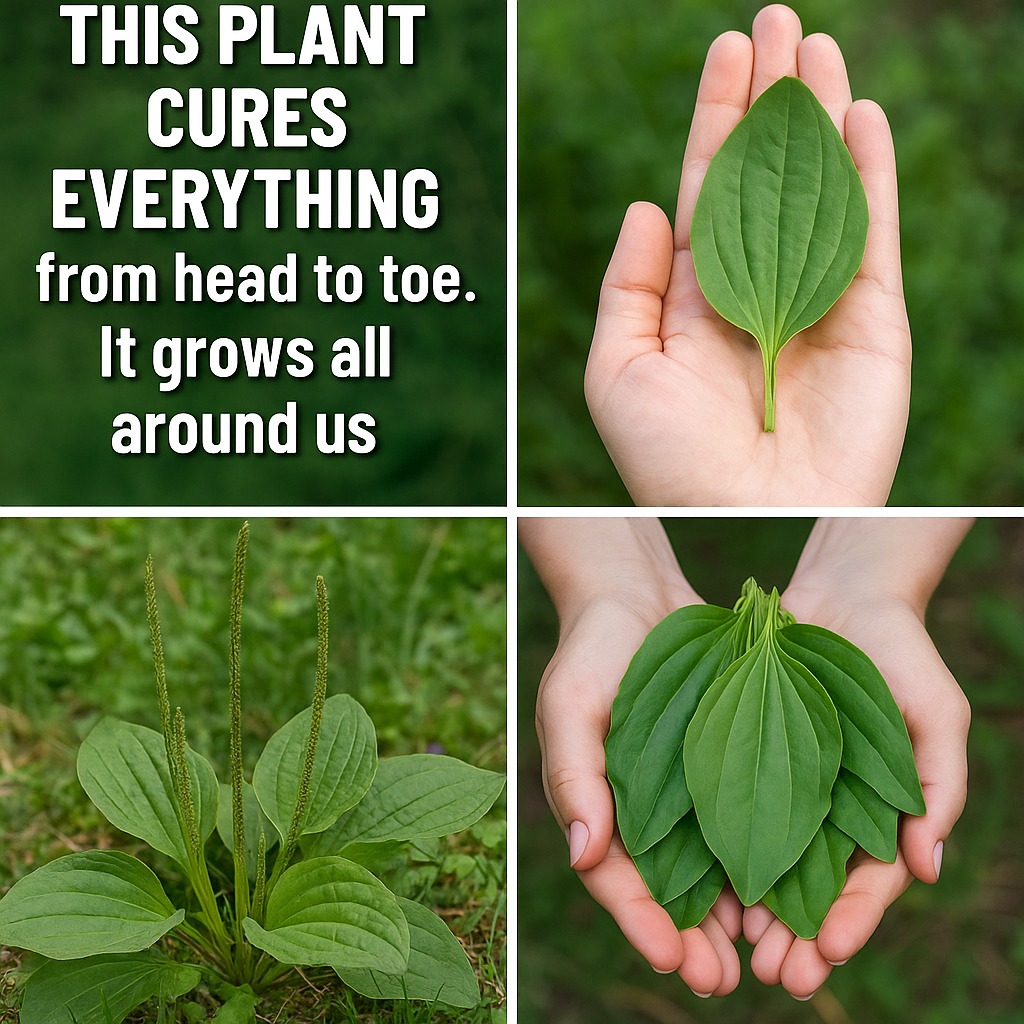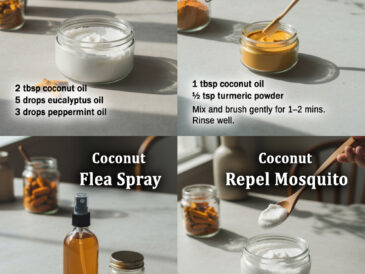Plantain leaves, often considered a common weed in many parts of the world, are actually a powerhouse of natural healing properties. From soothing skin irritations to supporting respiratory health and boosting the immune system, plantain is a versatile plant that has been used for centuries in traditional medicine. This humble plant is packed with anti-inflammatory, antimicrobial, and healing properties, making it an effective natural remedy for a variety of common ailments. Let’s explore how plantain leaves can help you feel better and improve your overall health.
1. Anti-Inflammatory and Antimicrobial Benefits
One of the most well-known and widely appreciated benefits of plantain leaves is their anti-inflammatory and antimicrobial properties. The leaves of the plant contain several active compounds, such as tannins, flavonoids, and iridoids, which work together to reduce inflammation and fight off infections. This makes plantain a great choice for treating a variety of skin irritations and wounds.
How to Use Plantain for Skin Irritations:
Plantain leaves can be crushed and applied directly to bug bites, burns, rashes, or wounds. The anti-inflammatory compounds in the leaves help to reduce swelling and redness, while the antimicrobial properties prevent infections, promoting faster healing. Whether you’ve got a mosquito bite or a mild burn, applying plantain to the affected area can provide immediate relief and speed up the healing process. It’s like having a natural first aid kit right in your backyard.
For best results, simply crush fresh plantain leaves and apply them to the affected area. You can also create a poultice by mashing the leaves and wrapping them in a clean cloth, then applying it to the skin.
2. Support for Respiratory Health
Plantain is known for its ability to support respiratory health, thanks to its anti-inflammatory properties. The plant contains compounds that help soothe the airways and reduce inflammation in the lungs, making it an effective natural remedy for respiratory conditions like bronchitis, asthma, and persistent coughs.
Plantain for Cough and Congestion:
Drinking plantain leaf tea is one of the easiest ways to benefit from its respiratory-supporting properties. Simply steep fresh or dried plantain leaves in hot water for a few minutes to create a soothing, anti-inflammatory tea that can help clear your airways and relieve congestion. The tea also works to soothe the throat, easing irritation caused by coughing.
If you’re dealing with respiratory congestion or a nagging cough, plantain tea can provide gentle but effective relief. The plant’s expectorant properties help loosen mucus, making it easier to expel from the lungs. Plus, the anti-inflammatory properties of plantain help reduce irritation in the throat and bronchial tubes, providing much-needed relief.
3. Digestive Support and Cleansing
In addition to its benefits for the skin and respiratory system, plantain leaves are also great for digestive health. Plantain is rich in fiber, which supports healthy digestion by promoting regular bowel movements and easing discomfort associated with bloating and indigestion.
Plantain for Digestive Issues:
Plantain leaves can help alleviate symptoms of various digestive issues, including diarrhea, constipation, and general stomach discomfort. The fiber in plantain helps regulate the digestive system, preventing constipation and reducing the frequency of diarrhea. It also soothes the digestive tract, reducing bloating and cramping.
To use plantain for digestive support, you can drink plantain leaf tea or incorporate the leaves into your diet in other forms, such as adding them to salads. The leaves can help balance the gut and promote a healthy, well-functioning digestive system.
Natural Remedy for Diarrhea and Constipation:
Plantain is known for its mild astringent properties, which can help reduce excessive bowel movements in cases of diarrhea. On the other hand, it can also act as a gentle laxative to relieve constipation, making it a great all-around digestive aid.
4. Versatile Natural Antibacterial
Plantain’s antibacterial and antimicrobial properties are one of the plant’s standout benefits. When applied to cuts, wounds, or sores, plantain leaves can help cleanse the area and prevent infection. The leaves work by killing harmful bacteria and promoting faster healing.
How to Use Plantain for Wounds:
To make a simple plantain poultice, crush fresh plantain leaves and apply them directly to the wound or injury. Cover the poultice with a clean bandage and leave it on for several hours. This will not only help to keep the wound clean but also promote the growth of new, healthy tissue. Plantain has been shown to significantly speed up the healing process, making it a valuable natural remedy for minor cuts and abrasions.
For larger wounds or persistent infections, you can also use plantain as part of a comprehensive treatment plan, but always consult with a healthcare professional if necessary.
5. Immune System Boost and Inflammation Relief
Plantain is rich in essential vitamins and minerals, including Vitamin C, beta-carotene, and iron, which support the immune system and help protect the body against infections and diseases. Regular use of plantain leaves can strengthen your immune defenses, making it harder for harmful pathogens to take hold.
Plantain for Arthritis and Joint Pain:
Thanks to its anti-inflammatory properties, plantain can also be beneficial for conditions like arthritis and joint pain. By reducing inflammation in the body, plantain helps relieve the pain and swelling associated with these conditions, providing a natural alternative to conventional anti-inflammatory medications.
For those suffering from chronic pain or inflammation, incorporating plantain into your daily routine can provide long-term relief. Whether you use it in tea form or apply it directly to the skin as a poultice, plantain is a gentle yet effective way to manage inflammation and promote overall health.
6. Easy Ways to Incorporate Plantain Into Your Routine
There are several simple ways to incorporate plantain into your daily routine, allowing you to reap its numerous health benefits. Whether you prefer a warm cup of tea or a refreshing salad, plantain offers a variety of ways to enjoy its healing properties.
1. Plantain Leaf Tea:
One of the easiest and most effective ways to enjoy plantain’s health benefits is by drinking plantain leaf tea. Simply steep fresh or dried plantain leaves in hot water for a few minutes. You can enjoy the tea on its own or add a touch of honey and lemon for added flavor. Drinking plantain tea regularly can help boost your immune system, improve digestion, and promote respiratory health.
2. Plantain Poultice:
A poultice is a great way to apply plantain directly to the skin for treating injuries, bites, burns, or skin irritations. Crush fresh plantain leaves and apply them to the affected area. For added convenience, you can wrap the poultice in a clean cloth to secure it in place. This method is highly effective for reducing inflammation, promoting healing, and preventing infection.
3. Plantain Salad:
For a fresh and nutrient-packed addition to your diet, consider incorporating young plantain leaves into salads. They have a slightly bitter flavor that pairs well with other leafy greens, such as spinach or arugula. The leaves are rich in vitamins, minerals, and antioxidants, making them a great choice for those looking to add more nutritious greens to their diet.
4. Plantain in Smoothies:
If you’re looking for a more creative way to include plantain leaves in your diet, try adding them to smoothies. Blend a handful of fresh or dried plantain leaves with other fruits and vegetables for a nutrient-dense, refreshing beverage. The fiber content will help support digestion, while the vitamins and minerals will give your immune system a boost.
7. Precautions and Considerations
While plantain is generally considered safe for most people, there are a few things to keep in mind. Always make sure you are using plantain leaves from a clean, pesticide-free source, especially if you are foraging them yourself. If you are unsure about any potential allergies or interactions with medications, consult a healthcare professional before using plantain as a remedy.
Additionally, some individuals may experience mild skin irritation from direct contact with the plant. Always perform a patch test before applying crushed plantain leaves to larger areas of the skin.
Conclusion: A Natural Healing Ally
Plantain leaves are truly a natural healing powerhouse. From their anti-inflammatory and antimicrobial properties to their ability to support digestion and respiratory health, plantain offers a variety of health benefits that make it an essential addition to any natural remedy toolkit. Whether you’re dealing with a bug bite, a cough, or digestive discomfort, plantain has you covered.
With its versatility and ease of use, plantain can be incorporated into your daily routine in many different forms. So, the next time you find yourself with a minor injury, upset stomach, or seasonal allergy, turn to this humble yet powerful plant for natural relief.
By making plantain a part of your wellness routine, you can enjoy the many healing benefits this incredible plant has to offer. Whether as a soothing tea, a skin-healing poultice, or a fresh salad ingredient, plantain is a simple, accessible, and effective way to support your health naturally.





